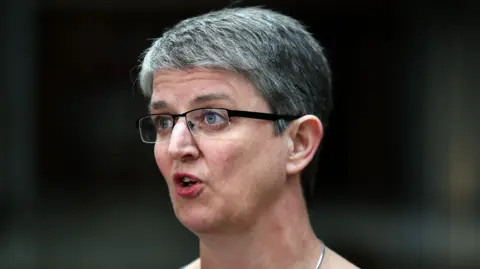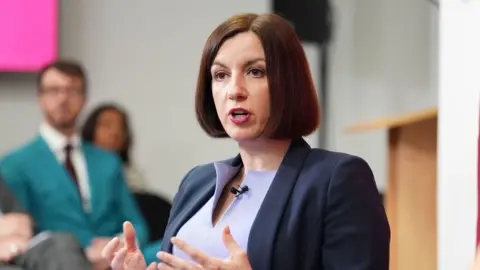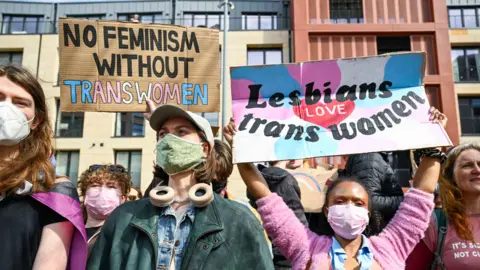Lawyers criticise MSP's attack on gender ruling
 Getty Images
Getty ImagesThe dean of the faculty of advocates has criticised Scottish Green MSP Maggie Chapman for what he described as "reprehensible" comments attacking the judiciary following the Supreme Court judgement on the definition of a woman.
Ms Chapman - the deputy convener of Holyrood's equalities committee - was filmed at a weekend rally condemning what she called "bigotry, prejudice and hatred coming from the Supreme Court".
In a letter to the committee, Roddy Dunlop KC called the remarks "outrageous" and said they created a "risk of danger" to members of the Supreme Court.
Chapman said she stands by her comments, and that it was her role to "stand up and represent trans people".
'Beyond the pale'
The Scottish government responded in parliament to the unanimous ruling that a woman is defined by biological sex under equalities law.
Scottish Social Justice secretary Shirley-Anne Somerville said the Supreme Court had delivered a "carefully considered judgement" which ministers "fully accept".
Ahead of that statement, Sir Keir Starmer's official spokesperson said the prime minister does not believe transgender women are women.
Protests were held at the weekend by pro-trans campaigners, with First Minister John Swinney saying he understood why the trans community would feel "uncertain and anxious" over the court ruling.
Chapman - a long time supporter of trans rights - attended a protest in Aberdeen and told the crowd: "We say not in our name to the bigotry, prejudice and hatred that we see coming from the Supreme Court and from so many other institutions in our society."
Roddy Dunlop KC said the comments were "beyond the pale" and that Chapman should consider her role as deputy convenor as her remarks conflicted with Scottish Parliament guidance on impartiality.
Dunlop, writing on behalf of all the governing body's office bearers, said her comments "fail to respect the rule of law" and "constitute an egregious breach of Ms Chapman's duties to uphold the continued independence of the judiciary".
He added: "But they go further than that, and create a risk of danger to the members of the court themselves.
"This behaviour is irresponsible and reprehensible."
He added that he expected a "swift and fulsome" apology from the MSP.
Alba MSP Ash Regan said she had reported Chapman to the Presiding Officer and standards committee, adding: "MSPs have a duty to uphold the law, not undermine it."
 PA Media
PA MediaSpeaking on Tuesday morning, Chapman said she would not apologise, and that institutions and laws reflected transphobia and prejudice present in society.
She also said the rule of law "still stands", but that it was her role to "stand up and represent trans people".
Last Wednesday's ruling was the culmination of a long-running legal dispute between the Scottish government and campaign group For Women Scotland over whether sex-based protections should apply to transgender people with a gender recognition certificate (GRC).
In a statement to parliament, Somerville said the Scottish government would amend guidance related to the legislation that sparked the Supreme Court judgment, which was designed to get more women onto public sector boards.
Somerville told MSPs that ministers would meet later in the week with the EHRC, which is expected to publish updated guidance by the summer.
The minister said the government would promote the rule of law as well as "equality, inclusion and human rights for all".
Scottish Conservative leader Russell Findlay said ministers should apologise to the women of Scotland.
He said: "The SNP's harmful gender ideology must now be rooted out of our entire public sector.
"Far too much time and taxpayers' money has been wasted on this nonsense."
'Legal clarity'
Deputy First Minister Kate Forbes, who was opposed to Scottish government plans to make it easier for trans people to be granted a gender recognition certificate, told BBC Scotland News she did not feel vindicated by the court ruling but that it had provided "legal clarity".
Trans campaigners have expressed concern the ruling would erase protections they have against discrimination in their reassigned gender.
Ahead of the Holyrood statement, the prime minister's spokesperson was asked if Sir Keir still believed that a transgender woman was a woman, as he had previously stated.
The spokesman replied: "No, the Supreme Court judgment has made clear that when looking at the Equality Act, a woman is a biological woman."
Bridget Philipson, the UK government's equalities minister, told the BBC's Today programme that trans women should now use toilets according to their biological sex.
But she stopped short of explicitly saying trans women should use the men's toilets.
She also said that further guidance by the Equalities and Human Rights Commission would be issued, including a statutory code of practice.
Philipson said this would ensure "everyone has the ability to access services that are safe and appropriate".
 PA Media
PA MediaThe Scottish government argued in court that transgender people with a gender recognition certificate are entitled to the same sex-based protections as biological women under the Equality Act 2010.
The judges unanimously ruled that the terms woman and sex in the 2010 Equality Act "refer to a biological woman and biological sex" rather than "certificated sex".
Michael Foran, a lecturer in law at the University of Glasgow, told the BBC the decision "has profound implications for trans inclusion in those spaces".
He added debate surrounding the ruling had been muddied by misinformation and "attempts to delegitimise" the Supreme Court.
He added: "It's incumbent on the government to communicate clearly what this judgement does and does not say, and to combat that misinformation."
